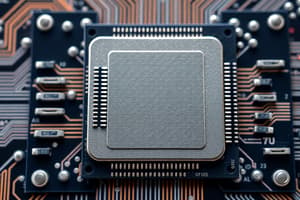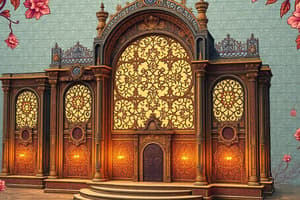Podcast
Questions and Answers
What does computer organization refer to?
What does computer organization refer to?
The operational units and their interconnections that realize the architectural specifications.
Which of the following are considered functional units of a computer? (Select all that apply)
Which of the following are considered functional units of a computer? (Select all that apply)
- Output Unit (correct)
- Arithmetic and Logic Unit (correct)
- Input Unit (correct)
- Graphics Card
Computer architecture concerns the operational units and their interconnections.
Computer architecture concerns the operational units and their interconnections.
False (B)
The information received by the input unit is stored in the computer's memory for later reference or immediately used by the ______ circuitry.
The information received by the input unit is stored in the computer's memory for later reference or immediately used by the ______ circuitry.
What is the role of the control unit in a computer?
What is the role of the control unit in a computer?
Which of the following is NOT a functional unit of a computer?
Which of the following is NOT a functional unit of a computer?
What is the basic structure of a computer?
What is the basic structure of a computer?
Which of the following are types of memory in a computer? (Select all that apply)
Which of the following are types of memory in a computer? (Select all that apply)
Computer architecture is only concerned with the hardware of the computer.
Computer architecture is only concerned with the hardware of the computer.
What does computer organization refer to?
What does computer organization refer to?
The list of instructions that performs a task is called a ______.
The list of instructions that performs a task is called a ______.
Match the following functional units with their descriptions:
Match the following functional units with their descriptions:
Flashcards
Computer Organization
Computer Organization
The operational units and their interconnections that fulfill architectural specifications.
Computer Architecture
Computer Architecture
The structure and behavior of a computer system; including information formats, instruction set, memory addressing.
Functional Units
Functional Units
The key components of a computer that perform specific tasks.
Input Unit
Input Unit
Signup and view all the flashcards
Memory Unit
Memory Unit
Signup and view all the flashcards
Arithmetic and Logic Unit (ALU)
Arithmetic and Logic Unit (ALU)
Signup and view all the flashcards
Output Unit
Output Unit
Signup and view all the flashcards
Control Unit
Control Unit
Signup and view all the flashcards
Instruction Set Architecture (ISA)
Instruction Set Architecture (ISA)
Signup and view all the flashcards
Addressing Modes
Addressing Modes
Signup and view all the flashcards
Computer Organization
Computer Organization
Signup and view all the flashcards
Computer Architecture
Computer Architecture
Signup and view all the flashcards
Functional Units
Functional Units
Signup and view all the flashcards
Input Unit
Input Unit
Signup and view all the flashcards
Memory Unit
Memory Unit
Signup and view all the flashcards
Arithmetic and Logic Unit (ALU)
Arithmetic and Logic Unit (ALU)
Signup and view all the flashcards
Output Unit
Output Unit
Signup and view all the flashcards
Instruction Set Architecture (ISA)
Instruction Set Architecture (ISA)
Signup and view all the flashcards
Addressing Modes
Addressing Modes
Signup and view all the flashcards
RISC
RISC
Signup and view all the flashcards
Study Notes
Computer Organization
- Refers to the structure and interconnection of various units within a computer system
- The physical arrangement and communication pathways between these units
- Deals with the implementation of computer architecture, focusing on the hardware elements and how they function together
Functional Units of a Computer
- Input Unit: Receives raw data and converts it into a form the computer can understand
- Output Unit: Presents processed data from the computer in a human-readable format
- Memory Unit: Stores data and instructions for the CPU to access
- Arithmetic Logic Unit (ALU): Performs arithmetic and logical operations on data
- Control Unit: Directs and coordinates the operations of all other units in the computer
Computer Architecture
- Concerns the operational units of a computer and their interconnections
- Defines the functional behavior of the system
- Specifies how the units communicate and how information flows
Data Flow
- The information received by the input unit is stored in the computer's memory for later reference or immediately used by the arithmetic logic unit (ALU) circuitry.
Control Unit
- The brains of the computer, responsible for the sequence of operations
- Interprets instructions from the memory unit
- Issues control signals to other units to execute the instructions
- Coordinates the activities of all other units.
Non-Functional Unit
- Hard Drive (Secondary Storage): While essential for storing and retrieving data, it's not considered a functional unit within the traditional computer architecture model.
- Hard drives are storage devices that act as an extension of memory and are not directly involved in the operational flow of the central processing unit (CPU).
Studying That Suits You
Use AI to generate personalized quizzes and flashcards to suit your learning preferences.




